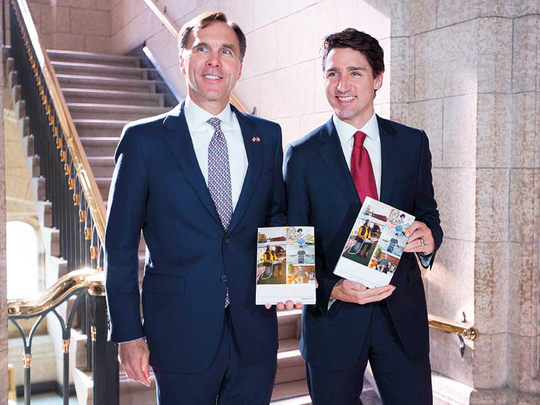
OTTAWA: He wasn’t mentioned once, but US President Donald Trump was all over Canada’s minimalist budget.
Prime Minister Justin Trudeau hit the brakes on new spending and major tax changes in a wait-and-see budget that marked a major shift for his activist administration, which last year unveiled an ambitious deficit-spending plan to stoke growth.
It’s a pause for Trudeau that’s likely being driven, in part, by uncertainty over the impact Trump’s administration — through trade measures, a border levy or cuts to US taxes and regulations — will have on Canada’s economy.
“We don’t know what Trump’s going to do,” said Craig Alexander, chief economist of the Conference Board of Canada, adding Trudeau’s government delivered “a very lightweight budget” with little new spending. “Perhaps the government of Canada wanted to pause a bit and see how things evolved before making big announcements in the tax base,” he said.
Steady deficits
Finance Minister Bill Morneau revealed his second budget Wednesday, forecasting deficits totalling C$127.8 billion ($96 billion; Dh352.5 billion) over six years, excluding a new C$3 billion annual risk-adjustment buffer. That’s down from a November forecast of C$129.5 billion. The government will also issue a record level of bonds in the upcoming fiscal year, and the budget made no explicit pledge to lower the debt-to-GDP ratio, a goal which had been included a year earlier. The budget still projected the ratio to decline.
Possible tax reform in the US is hobbling the Liberal government’s plan to finance part of its budget gap by eliminating tax credits and deductions that go primarily to high-income earners. The pace of US growth also plays a major role in the health of Canada’s economy.
Trump is “a factor looming in the background,” Bank of Montreal Chief Economist Doug Porter said. Morneau brushed aside questions of what impact Trump can have.
“A resilient economy is critically important if you are dealing with any global challenge,” and “none of us can know what’s around the corner,” Morneau said in a Bloomberg TV interview. “We are deeply engaged with our neighbours to the south. We want to make sure our trading relationship remains strong. Our budget though is about what we can do for Canada.”
Canada’s economy is starting to pick up, posting the fastest growth since 2013 in the second-half of last year. Recent data show manufacturing, trade, retail and wholesale sales exceeded economist forecasts in the last month, although Bank of Canada Deputy Governor Larry Schembri said Tuesday it’s still too early to assume the worst is over.
Trudeau’s budget included higher taxes on alcohol, tobacco, tourists, ride-sharing services and oil-and-gas exploration, while cancelling a tax credit for public transit.
It also pledged an upcoming paper that could ultimately change tax rules for private corporations, such as those incorporated by professionals. In his speech, Morneau said a review of tax expenditures highlighted “a number of issues” around tax planning using private corporations. “It’s pretty clear they’re going to do something about that,” Scotiabank Chief Economist Jean-Francois Perrault said.
The budget included no changes to capital gains taxes despite speculation the Liberals were eyeing a measure there. Morneau declined to say how closely he considered capital gains tax changes.
“What I can tell you, as you know, it’s not in our budget,” he said, adding the government was more struck by the use of private corporations to lower their tax-load. In his budget speech, he said the government “will have more to say on this in the near future.”
Debt ratio
The debt-to-GDP ratio is forecast to fall to 30.9 per cent by 2021-2022, down from 31.6 per cent in the two upcoming fiscal years. The budget and prepared speech did not say the government was committed to lowering the ratio. In a press conference, Morneau said “there is a path” for the debt ratio to fall, and that the measure “is what we’ve focused on as a fiscal anchor.”
The budget creates a government platform called “Innovation Canada” that will focus efforts on six sectors where Canada sees a competitive advantage. It will also launch a competition to fund certain “super-clusters” while allocating C$400 million from the Business Development Bank of Canada for Venture Capital Catalyst Initiative for late-stage venture capital.












